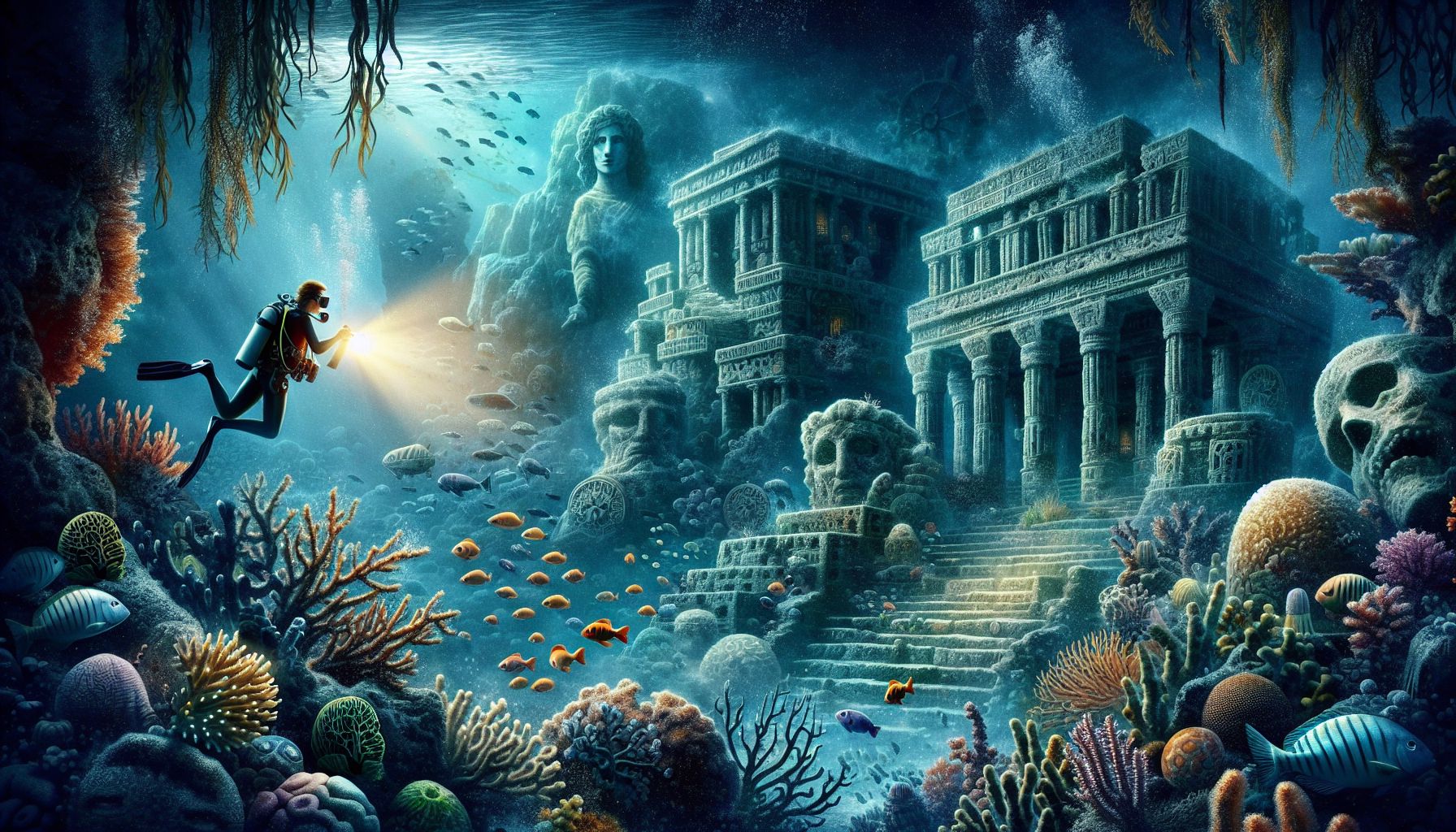The ancient civilization of Atlantis has captivated the minds and imaginations of people for centuries. Its story has been told and retold through various sources, with some claiming it to be a utopian paradise while others dismissing it as a mere myth. Yet, despite its elusive existence, the fascination with Atlantis remains. As we dive into the depths of this lost world, we unveil the mysteries and legends that surround it.
The Lost Continent of Atlantis
The first known mention of Atlantis comes from the ancient Greek philosopher Plato, who wrote about it in his dialogues “Timaeus” and “Critias.” According to his account, Atlantis was a naval power that posed a threat to Athens. It was an advanced civilization with great military strength, a prosperous economy, and remarkable knowledge of science and technology. Plato described it as an island bigger than Libya and Asia combined, located beyond the Pillars of Hercules (now known as the Strait of Gibraltar).
However, despite being widely accepted as the originator of the Atlantis story, Plato himself never claimed to have seen or visited it. Instead, he said that he heard about it from his ancestor Solon, who got the information from an Egyptian priest in Sais. This raises the question of whether Atlantis truly existed or if it was just a product of Plato’s imagination.
Theories on the Location of Atlantis
The exact location of Atlantis remains a mystery, and the subject of countless debates and speculations. Some theories suggest that Atlantis was a real place and was located in various locations around the world, while others argue that it was a fictional city created by Plato for teaching philosophical concepts.
One of the main theories is that Atlantis was located in the Atlantic Ocean, as Plato described it as an island beyond the Pillars of Hercules. Evidence cited in support of this theory includes the existence of the Canary Islands, which some people believe to be the remnants of Atlantis, and the ancient structures found underwater off the coast of Bimini, known as the Bimini Road. However, skeptics argue that the geological evidence does not support the theory, and the Bimini Road is most likely a natural formation.
Another popular theory is that Atlantis was located in the Mediterranean Sea, particularly in the Mediterranean island of Santorini. In the late 1800s, archaeologist Spyridon Marinatos discovered ruins of an ancient civilization on the island, which were later identified as the Minoan civilization. Some researchers have suggested that this could be evidence of Atlantis, as the Minoans were a technologically advanced society that disappeared suddenly in a catastrophic event, possibly a volcanic eruption. However, there is no solid evidence to confirm this theory.
Other theories suggest that Atlantis could have been located in the Caribbean, the North Sea, and even in Antarctica. The vast array of theories on the location of Atlantis only adds to its enigmatic allure.
Theories on the Demise of Atlantis
According to Plato, Atlantis was destroyed in a single day and night of “violent earthquakes and floods.” This has led to a wealth of theories about how Atlantis met its end. Some suggest natural disasters like earthquakes or volcanic eruptions, while others believe it was a war between Atlantis and Athens that caused its destruction.
One of the most popular theories is that Atlantis sank into the ocean due to a catastrophic event, such as a volcano eruption. This theory is based on the existence of the Minoan eruption on the island of Santorini, which was one of the most significant volcanic events in recorded history. The explosion is believed to have caused massive destruction and tsunamis, which could have potentially wiped out an entire civilization.
Other theories suggest that Atlantis may have fallen victim to a technological disaster, such as the misuse of advanced technology that caused the destruction of the entire island. Some even suggest that Atlantis was a victim of an alien invasion or the work of divine powers. With no evidence to support any of these theories, we can only speculate about the demise of Atlantis.
The Search for Atlantis
Due to its rich history and elusive existence, the search for Atlantis has been a popular subject among explorers, scientists, and treasure hunters. In the 19th century, researchers and adventurers began conducting expeditions to the Atlantic Ocean in search of Atlantis. In the early 1900s, self-proclaimed psychic Edgar Cayce claimed that Atlantis would rise again in 1968 or 1969, and a man named J. Manson Valentine even formed a company called Atlantis Research Labs Inc.
In recent years, advanced technology has been used to scan the depths of the ocean for any traces of an ancient civilization. In 2011, a mysterious formation was discovered off the coast of Spain, which some believe could be the remains of Atlantis. However, further explorations and tests have dismissed this theory.
The search for Atlantis has also extended to outer space, with theories that suggest Atlantis could be a lost planet or a civilization from a different galaxy. These theories rely on the idea that Atlantis was an advanced society with knowledge of space travel.
Myths and Legends of Atlantis
Over the centuries, the story of Atlantis has not only been told through Plato’s works but has also been incorporated into various myths and legends. The lost civilization has been featured in popular culture, ranging from books and films to video games and TV shows. Some famous works inspired by the legend of Atlantis include “Journey to the Center of the Earth” by Jules Verne, “The Little Mermaid” by Hans Christian Andersen, and “Atlantis: The Lost Empire” by Disney.
One of the most intriguing legends related to Atlantis is the idea of ancient aliens. Some people believe that the advanced technologies and knowledge described by Plato could only be possible with the help of extraterrestrial beings. They suggest that the Atlanteans were not humans but aliens who came to Earth to share their knowledge with humans.
The Legacy of Atlantis
While the existence of Atlantis may remain a mystery, it has left a lasting legacy on popular culture and our imagination. The legend of a lost city with advanced technologies and great power has inspired countless authors, artists, and explorers. The search for Atlantis has also led to advancements in technology, ocean exploration, and underwater archaeology.
Moreover, the story of Atlantis has served as a cautionary tale, warning us of the dangers of greed, aggression, and misuse of advanced technology. It reminds us that even the most prosperous and advanced civilizations are not immune to destruction.
Conclusion
The mysteries of Atlantis continue to intrigue us, and the quest to uncover its secrets remains a topic of great interest. While there is no concrete evidence to prove its existence, the legend of Atlantis continues to capture our imagination, inspiring us to delve deeper and uncover the truth behind this lost world. As we dive into the depths of the ocean and our imagination, we can only wonder if one day we will finally unravel the mysteries of Atlantis.






